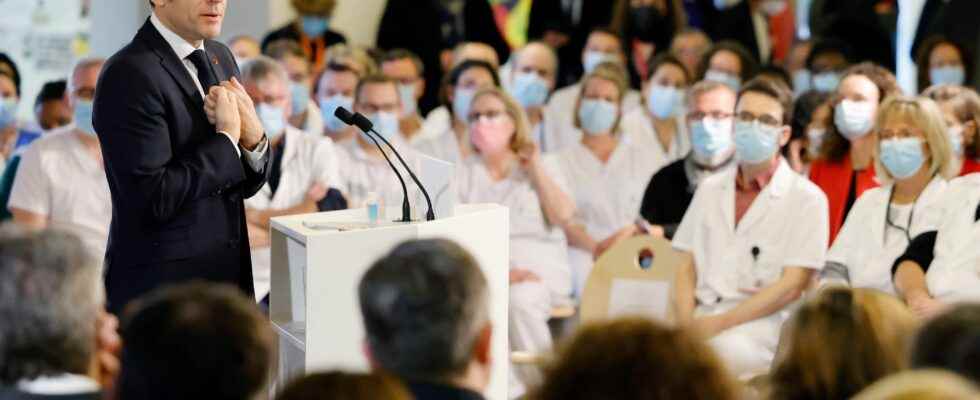A first class funeral. This Friday, January 6, on the occasion of his wishes for health, Emmanuel Macron officially unraveled the “HSPT” law and the hospital reforms implemented by Nicolas Sarkozy. Return of services as the main hospital management unit, establishments run by a doctor-administrative tandem, and above all, “end of activity-based pricing” which led to competition between establishments and a race for medical acts… If the announced measures materialize in the months and years to come, it will be a page that will turn in the hospital history of our country. It took nearly 13 years, a major health crisis and a system that came close to breaking up for the caregivers who had long denounced the decisions taken in 2009 to be heard.
This awareness that the time is no longer for competition but for cooperation, Emmanuel Macron also applies it to liberal medicine, with which he said he wanted to build “a new pact of rights and duties”. Contrary to the claims of the collective “Doctors for tomorrow”, which calls for an increase in the value of the consultation to 50 euros and the freedom to organize themselves, the President of the Republic heavily insisted on the need for doctors to cooperate – between themselves, with other health professionals (nurses, physiotherapists, pharmacists, etc.), and with the hospital.
This discourse is certainly nothing new, and some caregivers have already changed their organizations in this direction. But this time, the Head of State intends to take advantage of the ongoing negotiations between Health Insurance and doctors’ unions to encourage these practices. “We cannot revalue the act in the same way, we are going to do things more intelligently”, he indicated in front of caregivers gathered at the South Francilien Hospital Center (CHSF) in Corbeil-Essonnes, in the Paris suburbs. The message is clear: the price increases will mainly (only?) concern caregivers who will engage in a more collective exercise, and who will participate in on-call duty. “Duties” which will also concern practitioners practicing in the clinic, also encouraged to participate more in the permanence of care, “from the moment they receive public money”.
In fact, the needs of patients and the evolution of medicine imply, at least as much as the lack of caregivers, the need to work as a team to organize themselves more efficiently. This is also one of the great lessons of the Covid, and observers have been saying it for a long time: for the actors to want to continue to “cooperate” once the “war against the virus” is over, it was imperative to change the methods of remuneration. With these new orientations, Emmanuel Macron therefore hopes to succeed in making the “care access services” work everywhere in the territory for the reception of unscheduled care (which is not a matter of vital emergencies), but also to offer a better follow-up to the 600,000 chronically ill without a attending physician. At the scale of a territory, caregivers will have to organize themselves to offer them an answer.
More freedom and rights, but also more duties
Will this be enough to meet the expectations of health personnel and get the system out of “an endless crisis”? At the hospital, the nurses had long been demanding the abandonment of the organization in poles, which could oblige them to change departments very frequently, a very significant source of stress for them. As for the doctors, they had long wanted to regain control of the management of the establishments. In town, Emmanuel Macron also heard the requests, very consensual, to reduce unnecessary administrative tasks and not to supervise teleconsultations too strictly.
But if the president gave the main directions, he was careful not to detail the budgets that will be put on the table. Above all, he insisted on the massive investments already made – 19 billion euros on the occasion of the Ségur. And if he all the same hinted that additional means would be released, he did not quantify them. Thus, the question of the remuneration of night hours, a subject that is nevertheless essential for the attractiveness of the hospital and the proper functioning of the establishments, has been evacuated in a few words. A housing stock dedicated to caregivers has also been announced “where housing is expensive”, but the outlines of this measure remain to be specified. No additional recruitment targets for the hospital either: the president first wants to tackle the dysfunctions of the training of future nurses, too many of whom today give up along the way.
Many other points will also need to be clarified. If the exit from activity-based pricing (T2A) is announced, with a transition to “funding based on public health objectives”, it seems difficult to completely abandon this system, which can be adapted for certain disciplines. It will therefore be necessary to specify what will be, tomorrow, the part of the T2A which will remain and the type of acts on which it will continue to apply. The same applies to the organization of working time and the overhaul of the 35-hour working week – a subject which could create many new tensions in establishments. In town too, certain elements of Emmanuel Macron’s speech risk causing tensions in the weeks to come, and in particular the distribution of tasks with paramedics and the role of doctors in future “cooperation”. The subject is eminently sensitive. Because if it is a question of saving medical time, the doctors consider that they must play the conductors in this new organization around the patients. However, a bill from a Renaissance deputy, Stéphanie Rist, which should soon arrive in the Assembly, does not go at all in this direction…
Less freedom, more rights but also more duties: this new philosophy will also apply to patients. On this point, Emmanuel Macron heard the liberals who want to see patients who do not show up for appointments punished. An attractive idea on paper, but which promises to be complex to implement…
